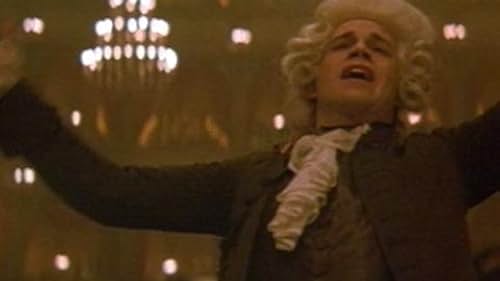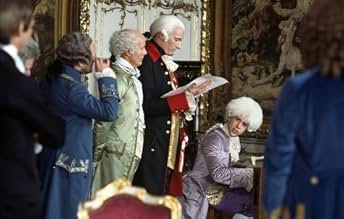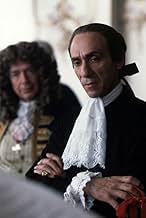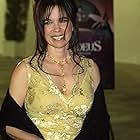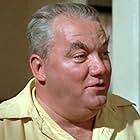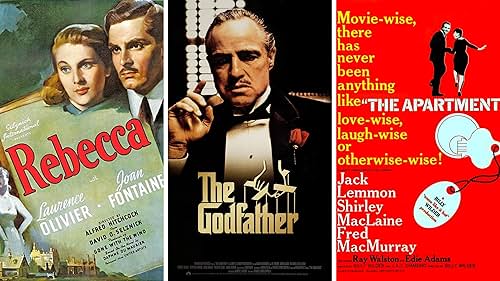The life, success and troubles of Wolfgang Amadeus Mozart, as told by Antonio Salieri, the contemporaneous composer who was deeply jealous of Mozart's talent and claimed to have murdered him... Read allThe life, success and troubles of Wolfgang Amadeus Mozart, as told by Antonio Salieri, the contemporaneous composer who was deeply jealous of Mozart's talent and claimed to have murdered him.The life, success and troubles of Wolfgang Amadeus Mozart, as told by Antonio Salieri, the contemporaneous composer who was deeply jealous of Mozart's talent and claimed to have murdered him.
- Won 8 Oscars
- 43 wins & 15 nominations total
- Papagena
- (as Lisabeth Bartlett)
- Young Salieri
- (as Martin Cavani)
Best Picture Winners by Year
Best Picture Winners by Year
Storyline
Did you know
- TriviaThe film ironically helped spark a revival of Salieri's music, which had previously languished in obscurity.
- GoofsBoth Mozart and Salieri are shown conducting an orchestra in modern style, by standing in front and waving the arms. In the 18th century, the conductor played first violin or harpsichord, the other musicians watching his head and hand movements. It was the rise of large orchestras in the 19th century that forced the conductor to abandon his instrument and take a more visible position.
- Quotes
Antonio Salieri: [reflecting upon a Mozart score] On the page it looked nothing. The beginning simple, almost comic. Just a pulse. Bassoons and basset horns, like a rusty squeezebox. And then suddenly, high above it, an oboe. A single note, hanging there, unwavering. Until a clarinet took over and sweetened it into a phrase of such delight! This was no composition by a performing monkey! This was a music I'd never heard. Filled with such longing, such unfulfillable longing, it had me trembling. It seemed to me that I was hearing the voice of God.
- Crazy creditsThe producer, screenplay writer and director thank the following for their boundless assistance in our effort to present the physical authenticity and aura you have seen and felt in "Amadeus": -The National Theatre of Czechoslovakia and Prague's Tyl Theatre management for allowing us to film in the Tyl sequences from the operas: "Abduction from the Seraglio," "The Marriage of Figaro," and "Don Giovanni." It was actually in this magnificently preserved theatre that Wolfgang Amadeus Mozart conducted the premiere performance of "Don Giovanni" on October 29, 1787. -His Eminence Cardinal Frantisek Tomasek for his kindness in permitting us to use his beautiful residence headquarters in Prague as the Emperor's palace. -The Barrandov Studios and CS Filmexport for their help in filming "Amadeus" in Prague and in castles and palaces throughout Czechoslovakia.
- Alternate versionsThe Orion Pictures logo, which was seen at the beginning of the film when it was first released theatrically, was not shown when the film played on both cable and commercial television, and is not seen on most VHS or DVD releases. It is included on the 1997 DVD of the theatrical cut.
- ConnectionsEdited into The Making of 'Amadeus' (2002)
- SoundtracksLe Nozze di Figaro (The Marriage of Figaro), K. 492, Act IV, Ah Tutti Contenti
(1786) (uncredited)
Music by Wolfgang Amadeus Mozart
Libretto by Lorenzo da Ponte
Performed by The Academy of St. Martin-in-the-Fields (as Academy of St Martin In The Fields)
Conducted by Neville Marriner
Excerpts Sung by Samuel Ramey (Figaro), Felicity Lott (Countess), Richard Stilwell (Count Almaviva), Isobel Buchanan (as Isabel Buchanan) (Susanna), Anne Howells (Cherubino), Deborah Rees (Barbarina), Alexander Oliver (Basilio), Robin Leggate (Don Curzio), John Tomlinson (Dr. Bartolo), and Willard White (Antonio)
That being said, Peter Shaffer's movie adaptation of his own play is still an astounding achievement. Have you ever seen a movie based on your favorite book and come out of the movie theater rather disappointed though the film version faithfully followed the storyline of the book? Amadeus is definitely not one of those movies. Shaffer clearly understands the difference between stage and film; the story is more elaborate in the movie, and some of the lengthy lines are replaced with more subtle images and close-ups.
I'm often surprised to find that people don't get that Amadeus is the story of the fictionalized character, Antonio Salieri, not the real one, who adored Mozart's music but hated everything else about him. In other words, the movie viewers are seeing Mozart through Salieri's eyes. Needless to say, his view is rather slanted. If you have read Shaffer's original play, you probably remember he describes Mozart's laugh 'grating.' In the film, this annoying laugh becomes more symbolic. Though Salieri speaks in front of a Catholic priest, he is actually having a one-sided discourse with God. At one point, he declares, "One day, I will laugh at you. Before I leave this earth, I will laugh at you." But as he is wheeled out of his room by an aide at the asylum, what we hear is that screeching laugh of Mozart--or is it? It becomes obvious as we watch that this movie is called Amadeus because that's what Salieri wished to be--God's beloved.
The movie might give some viewers who don't know much about Mozart a wrong impression that he was a cad, and it gives incorrect information on some of his music (e.g.; the count in The Marriage of Figaro sings "Contessa perdono" AFTER he learns that the woman dressed in the maid's clothes is his own wife. There's no mistaken identity here. Read the title of the song--Countess, forgive me!), but these are minor offenses. Though I am a die-hard Mozart fan, I can laugh at tongue-in-cheek references to Amadeus in other movies. My favorite? In Guarding Tess, a secret service agent tells his partner, "He (Mozart)'s a jerk. One day, a guy shows up with a mask, and he drops dead."
What's not to like about Amadeus? The tale Peter Shaffer tells is gripping, the actors are first- rate, and, of course, there's music. The selection of Mozart's music in the movie is excellent; you can truly enjoy the beauty of his music no matter how much or how little you know about it. In case you are wondering, a little tune Mozart plays on his back and hands crossed as a penalty at a party is Viva Bacchus from The Abduction from the Seraglio, a duet for Pedrillo and Osmin. Pedrillo, while singing this song, is trying to get Osmin, the harem guard, drunk to help his master rescue his true love. No wonder Schikaneder calls it 'our song.' And the improvised version of Salieri's welcome march is actually a famous song, Non piu andrai farfallone amoroso, from The Marriage of Figaro.
As I said, I'm a huge Mozart fan, so my rating may be somewhat biased, but what the heck, I gladly give ten stars to Amadeus. I watched it close to a hundred times over the years, and it still gives me a great pleasure every time I see (and hear) it.
Details
- Release date
- Countries of origin
- Official site
- Languages
- Also known as
- Peter Shaffer's Amadeus
- Filming locations
- Barrandov Studios, Prague, Czech Republic(Studio, Volkstheater, Hospital Room, Mozart's Apartment and Staircase sets)
- Production companies
- See more company credits at IMDbPro
Box office
- Budget
- $18,000,000 (estimated)
- Gross US & Canada
- $51,973,029
- Opening weekend US & Canada
- $505,276
- Sep 23, 1984
- Gross worldwide
- $52,075,942
- Runtime2 hours 40 minutes
- Color
- Aspect ratio
- 2.39 : 1
Contribute to this page


